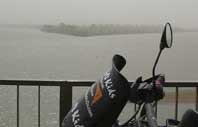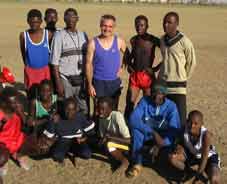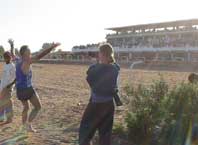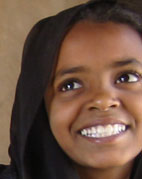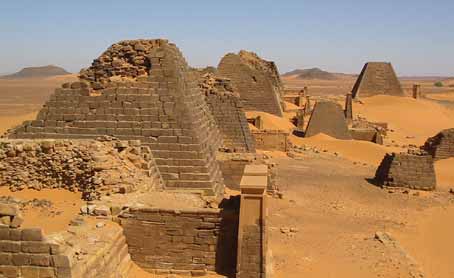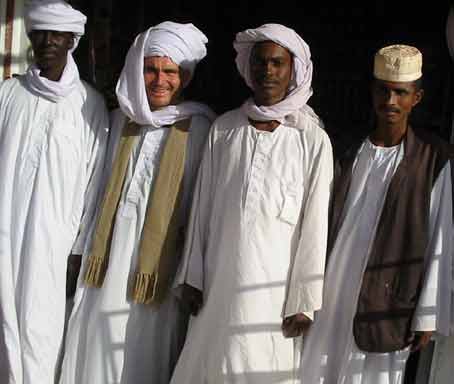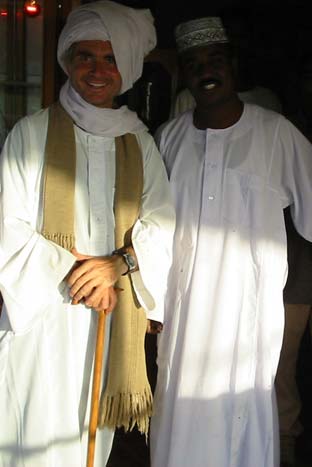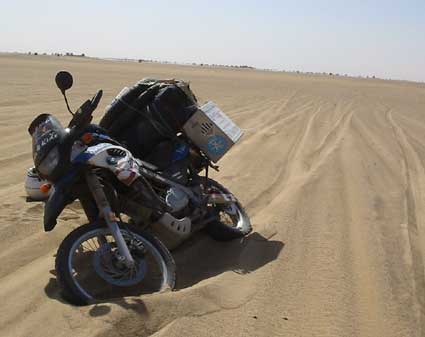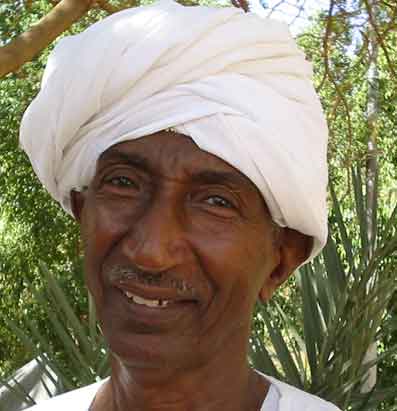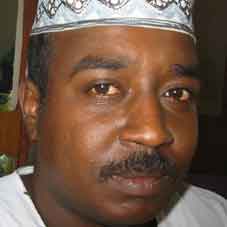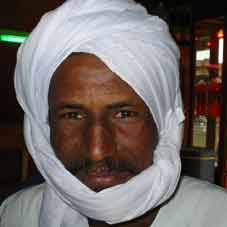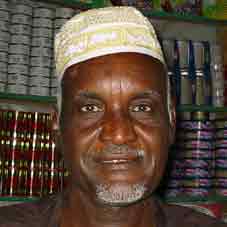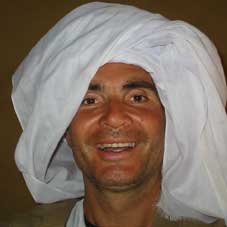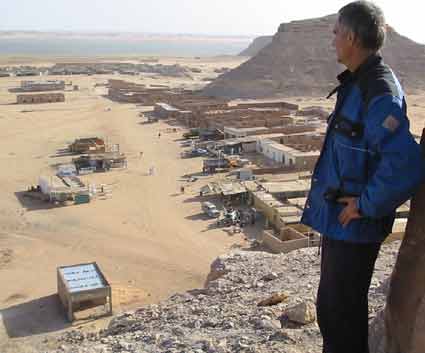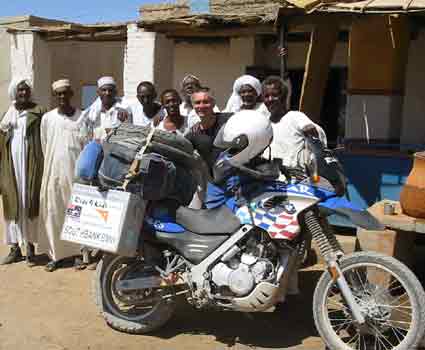Sand, desert and friendly
people!
Sudan
is the largest country in Africa and stretches from the deserts of Nubia through
the swamps of the Sudd to the equatorial rainforests of the south. Like neighbouring
Chad, it straddles the dividing line of two cultures; the Arab, Muslim North
and the black south. It has border with 9 other countries including Libya, Egypt,
Congo, Uganda, Ethiopia and Eritrea. Large areas of the country, mostly in the
south, are currently off limits to travellers because of its debilitating civil
war.
It has a population of around 30 million inhabitants but wherever I went I was
struck by the natural
charm,
dignity and hospitality of the Sudanese people.
Sudan is not a touristy place, it has not really anything to offer them, and
the only travellers that I met were some intrepid overlanders on their way south
or coming from the west on motorbikes or Land Rovers.
Khartoum,
the capital, is situated at the confluence of the White and Blue Niles and has
modern buildings and wide, tree-lined boulevards.
Thursday 30 January 2003.
The custom was 36 km from the actual border. Someone had warned me to take
care at the entrance of the town
as
there is a piece of rope across the road to stop the traffic, very dangerous
when you are on a bike. I went through the custom without any problem but just
as I was leaving, a big truck decided to leave as well, I could not believe
it, and I was going to be stuck behind him, so I had to overtake him quickly
before he sped up. The dust was very thick behind him but I still overtook him
even though I could not see anything. When I reached the front of the truck,
he slowed down, I thought that was because he had seen me but as the dust cleared
a bit I had the shock of my life when I saw another rope just meters away across
the road. I jumped on the breaks and just managed to stop centimetres from the
rope. That was a close call, some ladies were laughing, probably their only
excitement for the day. So if you happen to travel on that road remember that
there are two ropes.
By the time I reached the actual border they all had left for lunch and I was
told to wait until 2pm, it was only 11am.
The border on the Sudanese side was extremely busy due to the formal opening
of the new road (unpaved) and of the new immigration offices. I was actually
the first person to go through it but it did not make any difference as I had
to wait some more for the ceremony to finish.
I got going again at around 3pm and reached Gedaref, my stop for the night,
two and half hours later. I found a cheap hotel to stay and met a Japanese traveller,
cycling his way across Africa. He had started his journey 9 months ago from
Cape Town and more or less followed the same way than I did. He told me that
he was hoping to reached Turkey in May or June, the final country of his Tour.
The next day, I left at 7am and found a beautiful sealed road all the way to
Khartoum. I covered the 430km to the capital in less than 6 hours; the countryside
was very flat, dry and sandy.
Once in Khartoum, I had a bit of trouble finding my way around as no roads have
names. Eventually I found the Blue Nile Sailing Club and was told that I could
camp there for US$5 per night.
Fridays, in Islamic countries, are like Sundays for us, everything is close
and today, at the Sailing Club, its sailing competition for the rich which include
a BBQ buffet.
The president tells me that today is a busy day but "just make yourself
at home", I don't know if that meant take a plate and help yourself with
the food but that exactly what I did. How could I resist all the fresh salads,
the freshly cooked meat and all the beautiful deserts after the food of Ethiopia?
On top of that the club is situated in a fantastic location on the banks of
the Blue Nile.
I ate enough food to last me three days and got back on the bike to search for
a cheaper place to camp. As I was asking around, a German overlander noticed
me and indicated me another place. I reached it at around 5pm, already; two
other Germans on motorcycles were camping there, as well as some other overlanders
in cars and trucks. Perfect place when you are looking for info for the roads
ahead.
The following weeks were spent at organizing visas and repairing one of my boxes
which had cracked on one of my falls.
I was hoping to avoid Egypt by taking a boat into Saudi Arabia, but the officer
at the embassy told me that I would have to wait another two weeks and that
all they would give me would be a transit visa for three days. The reasons why
I wanted to bypass Egypt were because of the very tough road leading to it and
of the cost of entering Egypt.
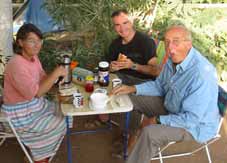
I
waited for two weeks and returned with a German couple (pictured with me while
having breakfast) travelling with a Land Rover. In no time we had everything
done and were told to come back in the afternoon to pick up our passports with
our visas in it. We were so happy, but my joy was short lived. As we were walking
back to the car they called me back and told me that they could not issue me
a visa because their government did not permit motorcycle
on
the roads in Saudi Arabia. I know that was bullshit (excuse my French), I have
heard of other overlanders riding in Saudi but I think it was because of my
Australian passport. Thank you to "little Johnny Howard" for supporting
George Bush in his quest to get reed of Saddam, I have now to go to Egypt and
that pisses me off! Since that, when people ask me where do I come from, I am
happy to tell them that I am from France and they always show their appreciation.
(Sudan enjoy good relation with France)
I
got my visas for Jordan, Egypt and Syria quite easily and some engineering place
fixed my broken Touratech box free of charge.
While waiting in Khartoum, I met the national athletic coach of Sudan. He told
me that that afternoon all his runners would be racing in a 4.4km cross country
race. They picked me up from the camp at 3pm; the race was schedule at 5pm and
was held at the Khartoum Racecourse. The race was going to be run in between
horse racers.
There
were 20 of us including 2 women; all of them were world class runners, even
Olympians but that did not worry me too much, I had made sure that the organizer
of the race knew all about my current condition and my lack of training which
in turn he told the public. Those guys were running for money, big money for
them, I am not sure if the public was betting on our race as well but if they
did I am sure that I was the "dark horse".
The gun went off at 5pm, it was still around 32
degrees,
I was last straight from the start as the leaders disappeared quickly in the
dust, one of the girls was only meters in front of me, I was working very hard
to stay with her, one of the man kept on stopping to take thorns out of his
foot, he was running bare foot. After the
first
lap, I had lost touch with the girl but saw one of the men walking in front
of me, obviously a sprinter, them I passed another one walking as well, that
meant that I was not last anymore, unfortunately, meters front the finish they
sprinted pass me under the cheers of the crowd.
What a race! I was the first master, first white person and first European over
the line but last over all but I got probably as much cheers from the crowd
than the winner.
For
the record, the winner's time was 12.02 mn and mine 19.15mn.
One day, still waiting for visas, I rode to Meroe, 250km Northeast of Khartoum.
The ancient royal city of Meroe is one of Sudan's most spectacular sights. While
not on the scale of the Pyramids of Giza, their sheer number and dramatic desert
location made a worthwhile day trip. For the historians among you, Meroe thrived
from 592 BC until it was overrun by the Abyssinians in AD 350.
Thursday 20 February.
I left Khartoum early to avoid the heat in the afternoon. I knew the road
was sealed for the first 350km, which I covered in 5 hours. I could only managed
80k/h due to a very strong side wind blowing sand as well across the road.
In normal weather condition I can do around 400km on a full tank but that
day the emergency light appeared after 300km and with no petrol station to
be seen I started to panic a little. Fortunately I reached Abu Dom (end of
the sealed road) just before running out. I went straight to the petrol station
but was told that they only had diesel. A
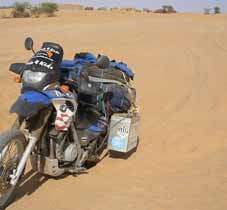
local,
seen that I was desperate, went to search for some and brought me 4 liters.
That was enough to get me to El Ddebba only 40km away and my stop for the day.
It took me 3 hours to reach it, falling and getting stuck in the sand. Every
time I had to call some locals to help me get the bike out, the back wheel would
get stuck up to the axel in the sand (pictured). When I finally arrived in El
Ddebba I was so exhausted that I decided to take the following day off, to recover.
The people in that town are extremely friendly and I spent the following day
going from house to house
enjoying their hospitality, drinking tea and
eating fuul (stewed brown beans). Again, I was reminded that in an Arabic
country you eat only with your right hand, gosh! How many times do I have
to be told, it's embarrassing.
I had a terrific day, thanks to their joie de vivre, generosity and kindness.
Saturday 22 Feb.
I knew that today was going to be a tough day; sand, sand and more sand was
the menu of the day.
I left at 8.30 and after 10km I was already stuck in deep sand, I stopped
a pick up truck and with the help of a few strong guys I was back on the road
or should I say back on the sand. I had been told to stay away from the Nile,
at least 5km from it as the tracks are better but the problem is that there
are tracks everywhere and going in all directions, so it's hard to know if
you are on the right track. Sometimes I would be so far from the Nile that
I could not see the tall trees that grow along it or the minarets from the
mosque in the villages.
The worse was when I got stuck in the middle of nowhere and with absolutely
nobody around. I had to take the entire luggage off the bike and dig the sand
around the back wheel in order to free the bike. The all exercise took one
and half hour in the hot sun with no shade at all. I swore to myself that
I will never ever do something like that again! When I got going again I started
to worry; was I lost? All I could see around me was sand, no trucks or other
vehicles; the only thing that was telling me that I was in the right direction
was the sun. Gradually the sand became not so deep and eventually made place
for a much harder surface. I arrived in Dongola, stop for the day, at 2 pm
having covered only 150km.
The next morning I was already on the road at 7am, I followed a sandy track
for 40km then I crossed the Nile on a ferry at Argo. There, I filled up with
petrol and took another 4lt with me; I knew that Argo was the last major town
where I could get petrol. At first, the tracks went in all directions again
but soon it became evident which one to follow. Even though the tracks were
not so sandy they remained pretty rough and corrugated. I was not able to
travel above 30 or 40 km/h. The tracks were following the Nile and I went
through some very tidy villages with
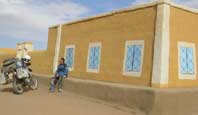
beautiful
houses (pictured), wherever I stopped, the people were extremely friendly, offering
me cold drinks and cups of tea.
When I finally reached Abri, it was 5 pm and time to stop for the day. I had
cover 240km and had only 180km left before Wadi Halfa. As I was contemplating
where I was going to
spend
the night, a young teenager approached me and in good English inquired about
the purpose of my visit to his village. I told him that I was only passing by
and that I was on my way to Egypt. That was enough for him to invite me to spend
the night in his family home.
He told me that his father had died only four
months ago after a straight forward stomach surgery that had gone very wrong
due to the negligence and malpractice of the local doctor who was now deservedly
in jail. We had dinner and were in bed pretty early, for me anyway.
The following morning, I left my host at around 9am, after a very simple but
tasty breakfast. With only 180km left I was eager to get there early but the
road was so badly corrugated that it was hard to maintain a decent speed. Also,
that region is almost uninhabited; I only saw one car and a couple of houses
along the way. Nevertheless, I arrived in one piece at Wadi Halfa where I had
to wait a couple of days for the weekly ferry to Egypt as there is no overland
border between the two countries.
Wadi Halfa is a very spread out and sandy town with absolutely nothing to do.
It only comes alive on Tuesday and Wednesday when the people from the train
and the ferry meet. I found a very basic hotel and shared a room with Peter,
a German backpacker, on his way to Egypt as well. The hotel rooms were made
of corrugated iron sheets with a wooden roof and just sand as a floor.
Wednesday 26 February.
It took most of the day to get everything organized and even though we were
told to be ready by 2pm, the boat only got going at 6pm. So with the bike
safely in the boat, enough food and water to last a week, we set out across
Lake Naser, toward Egypt, some 200km away.
As I watched the Sudanese shore disappeared slowly in the sunset I knew that
I was saying good-bye to the real Africa.
I
have visited many countries in my life but I have no hesitation to say that
the Sudanese people are the friendliest of them all, never have I met such kindness
and generous behaviour in humans being before.
And yes, it is a Muslim country.
Click here for more photos.
Des
deserts, du sable et des gens super!
Le
Soudan est le plus grand pays d'Afrique, au nord on y trouve les Arabes
(Islamique) et au sud les noirs (chrétien). La région du sud est
inaccessible à cause de la révolution qui dure depuis plus de
20 ans. Le Soudan a des frontières avec 9 pays différents dont
le Chad, la Libye, l'Egypte, l'Uganda, le Kénya et le Congo.
Il compte une population de plus de 30 millions d'habitants et partout ou je
suis allé j'ai été touché par leur charme naturel,
leur dignitée et de leur hospitalitée.
Le Soudan n'est pas un pays touristique, on y rencontre que des voyageurs indépendent
parcourant l'Afrique avec leurs propres véhicules. C'est aussi un point
de rencontre important car on y croisse des gens venant du Chad, d'Ethiopie
ou d'Egypte, donc trés important si l'on a besoin d'informations sur
les routes futures.
Khartoum, la capital, est situé au confluent du Nil blanc et du Nil bleu.
C'est une ville trés étendu avec des buildings moderne et avec
des grands boulevards bordés d'arbres.
Jeudi 30 janvier 2003.
L'immigration se trouvait à 36 km de la frontière, dans un petit
village. On m'avait prévenu de faire attention car il y a une corde
en travers de la route pour arrêter le traffic, trés dangereux,
surtout en moto. Pas de problème pour passer l'immigration et je reprenais
la route rapidement. Malheureusement un camion partait au mème moment
mais devant moi, il fallait à tout prix que je le passe avant qu'il
ne prenne de la vitesse car avec la poussière derrière lui la
visibilitée était nul. En le dépassant, je ne voyais
absolument rien et quand je suis arrivé à la hauteur de la cabine
il a ralenti, je pensais que c'était parcequ'il m'avait vu mais quand
la poussière c'est dissipé j'ai compris pourquoi il ralentissait,
juste devant moi, à une cinquantaine de mêtres, il y avait une
autre corde. J'ai réussi à m'arrêter à quelques
centimêtres de la corde, pas facile car il fallait éviter de
déraper sur les graviers. Alors que je reprenais mais esprit, deux
femmes riaient, probablement leur seul excitement de la journée. Alors
si vous passez un jours par là, rappelez-vous qu'il y a deux cordes
et pas une seule.
J'arrivais à la frontière à 11 heures mais je devais
attendre jusqu'à 14 heures car les douaniers étaient partis
casser la croûte. Du coté Sudanais ce n'était guère
plus rapide car ils célébraient l'ouverture du nouveau poste
de douane et j'étais le premier à l'utiliser. Je reprenais la
route vers 15h30 et je devais foncer pour arriver à Gedaref avant la
nuit. Heureusement la route, bien que pas goudronnée, était
en bon état et j'arrivais à Gedaref sain et sauf à 17h30.
Je trouvais un petit hotel pour passer la nuit. Là, je rencontrais
un Japonais qui traversait l'Afrique, plus ou moins la mème route que
moi, en vélo. Il était parti du Cape 9 mois plus tôt et
espérait finir en Turquie au mois de Mai.
Le lendemain, je repartais de bonne heure sur une belle route goudronnée
vers Khartoum, à 430km de Gedaref.
Quand on arrive dans une nouvelle ville c'est toujours un peu difficile de
s'orienter, à Khartoum c'est pire car c'est une ville trés étendu
avec aucun nom de rue. Donc j'ai tournais en rond un bon moment avant de trouver
un camping sur le bord du Nil que l'on m'avait recommandé. Hélas,
ils demandaient 5 Euros par nuit, beaucoup trop cher pour mon petit budget.
Mais comme c'était vendredi, jour férié dans les pays
islamique, le président d'un club de voile avait organisé un
grand BBQ pour les membres de son club. Quelqu'un, me prenant pour un invité,
me donne une assiétte et me dit de me servir. Comment pouvais-je résister
un repas comme-ça ? des salades bien fraiches, de la viande cuite à
point et des desserts à n'en pas finir. Je chargeais mon assiétte
au maximum, au cas ou je serai découvert, je m'installais á
l'hombre des regards et je dégustais mon festin tranquillement. Je
me permettais mème d'y retourner pour un peu plus de dessert. Ayant
manger pour deux (voir trois) je repartais discrétement en moto en
quête d'un endroit plus en ligne avec mon budget. Un voyageur Allemand,
dans un Land Rover me remarquait et m'indiquait le camping ou il logeait quelques
10 kms plus au sud de la ville. Pour un Euros par nuit c'était idéal.
Il y avait un autre couple Allemand au camping, eux voyageaient en motos et
venaient d'Egypte. Dans les jours qui suivèrent d'autres voyageurs
sont arrivés, certains en 4x4 et d'autres en camions, 4x4 tout amènagés.
Endroit idéal pour trouver des informations sur les routes futures.
Un couple Français, venant de Paris et voyageant avec une Land Rover,
s'en allaient vers le Cap. Vous pouvez suivre Angélique et Marek en
cliquant sur www.paris-lecap.com
J'avais prévu d'essayer d'éviter l'Egypte, premièrement
parce qu'ils demandent trés cher pour amener son propre véhicule
chez-eux et deuxièment parce que la route vers l'Egypte est trés
difficile, beaucoup de sable et avec tout les baggages que je transporte ma
moto est trés lourde, en plus je n'ai pas les pneus pour. J'avais entendu
dire qu'il était possible de passer par l'Arabie Séoudite à
la place, en traversant la Mer Rouge à Port Sudan jusqu'à Jedda.
Je suis donc allé à leur ambassade pour leur demander un visa
de transite. Comme c'était une période trés religieuse
à la Mecca il y avait beaucoup de Sudanais qui y allaient en pèlerinage
donc le bateau était plein mais ils m'ont dit de repasser dans deux
semaines que d'içi là il n'y aurait pas de problème.
Comme je n'étais pas trés préssé d'aller en Europe
(il y fait froid à cette époque) je décidais d'attendre.
Entre temps j'organisais mes visas pour la Jordanie, la Syrie et pour l'Egypte,
en cas de refus du visa d'Arabie.
Un jour, j'ai rencontré l'entraîneur de l'équipe d'athlètisme
du Soudan. Il m'invita à participer à une course à pied
de 4,4km (cross country). Je lui répondais que mes conditions physique
n'étaient pas ce qu'elles étaient faute d'entrainement. "
C'est pas grave " me dit-il " cela amusera le public " N'ayant
rien d'autre à faire j'acceptais.
La course se déroulait sur un hippodrome, entre deux courses de chevaux.
Nous étions une vingtaine au départ, tout les participants,
à part moi bien sur, étaient des athlètes de haut niveau
et couraient pour de l'argent. Le départ était donné
à cinq heures précis, devant des tribunes pleines
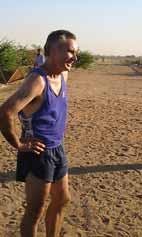
et sous un soleil ardent. Nous devions parcourir
deux tours, la piste était sableuse. Dès le départ je me
retrouvais le dernier alors que les premiers disparaissaient dans un nuage de
poussière. Certains concurrents couraient pied nu et devaient s'arrêter
pour retirer les épines qu'ils attrappaient dans les pieds, j'en profitais
pour les passer. Quand j'ai bouclé le premier tour en passant devant
les tribunes, je pouvais entendre le public qui m'applaudissait et criait pour
m'encourager. A un km de l'arrivée il y avait deux coureurs derrière
moi mais ces derniers me dépasser à quelques mêtres de la
fin. J'ai donc fini le dernier mais pour me consolais je me disais que j'étais
quand mème le premier blanc, le premier Français-Australiens,
le premier master, le premier pâtissier, le premier portant un short bleu...
Pour ceux qui seraient interressés, le premier finit en 12 mn 15 second
et moi en 19 mn 20s.
Samedi 15 Février.
Il était temps de retourner à l'ambassade d'Arabie Séoudite.
Donc, plein d'optimiste, j'y retournais avec un couple Allemand voyageant en
voiture. Nous avions bien préparés tout nos papiers car nous savions
qu'ils étaient trés éxigeant, en plus nous ne voulions
plus de délai suplémentaire. Tout ce passait trés bien,
le visa était accordé, on le payait et retournions gaiement à
la voiture, fier d'avoir réussi à franchir cette barrière.
C'est au moment ou les Allemands sortaient leur appareil photo pour prendre
une photo de famille qu'un des officiers m'a rappelé dans les bureaux
et me demandait le numéro d'immatriculation de ma voiture, je lui disais
que ce n'était pas une voiture mais une moto. Aprés avoir délibérer
avec ses collèques il est revenu et il m'a dit que son gouvernement notorisait
pas les motos sur les routes de son pays, qu'il était désolé.
Il m'a redonné l'argent du visa. Cela là n'est qu'une excuse car
je connais des motards qui ont traversés l'Arabie, je pense que c'est
à cause de mon passport Australien qu'ils m'ont refusés le visa.
Notre Premier ministre soutient George Bush pour la guerre contre l'Irak alors
que l'allemagne est contre.
J'étais donc forcé de passer par l'Egypte.
Jeudi 20 Février.
Je suis parti de khartoum assez tôt pour éviter les hautes températures
de mi-journée. Je savais que les premiers 350km était sur une
route goudronnée. Dans des conditions normales je fais environ 400km
avec un plein mais ce jour là j'avais un vent trés fort de face,
emportant du sable avec lui, des conditions vraiment difficile et aprés
250km le voyant de mon compteur m'indiquait que je n'avais presque plus d'essence.
Le problème c'est que entre Khartoum et Abu Dom il n'y a absolument
rien, c'est le desert complet. Que faire ? Je ralentissais au maximum, roulant
à 50km/h et finalement j'arrivais à Abu Dom avec un réservoir
sec. Un gars me dit qu'içi il n'y a que du diesel mais avec un pourboire
il pouvait me trouver 4litres. J'acceptais car je n'avais pas le choix et
je payais plus du double du prix normal mais je savais qu'avec ces 4 lt je
gagnerai El Ddebba et là je pourrai faire le plein. El Ddebba était
à seulement 40km mais c'est une piste avec plus ou moins beaucoup de
sable. Cela m'a pris 3 heures pour y arriver. Je m'enlisais plus d'une fois,
la roue arrière enfoncée dans le sable jusqu'à l'axe.
Je devais enlever tout mes baggages, mème les deux boites en aluminium.
Je progressais tout doucement et je suis arrivé au village tard dans
l'aprés-midi, épuisé et assoiffé.
Je décidais de passer la journée suivante dans ce village, les
gens étaient tous super sympa. La journée se passa à
aller d'une invitation à l'autre, d'une tasse de thé à
une autre, à manger du full (bouilli d'haricots ou fayots et plat traditionnel
du Soudan).
Je savais que la journée suivante allait être difficile, du sable,
encore du sable et toujours du sable, le menu de la journée. J'en plaisante
maintenant mais je peus vous assurer que j'en ai vraiment bavé et que
jamais je me lancerai dans une expédition pareille tout seul. Je me
suis retrouvé plus d'une fois complètement enliser, en plein
milieu du desert, avec que du sable autour de moi et n'ayant aucune idée
dans quelle direction continuer. C'est dans ces moments là que l'on
se dit que peut-être on est allé trop loin, poussé sa
chance un peu de trop....
J'ai continué en persévérant, petit à petit et
enfin j'ai revu au loin le bord du Nil et là je savais que j'étais
sauf, qu'il y aurait des gens, de l'eau et du réconfort.
Je passais la nuit à Dongola et repartais le lendemain matin sachant
que la piste serai moins sableuse. Au départ il y avait des pistes
allant dans toutes les directions mais je savais qu'elles aboutiraient toutes
à Abri, étape de cette journée. Je parcourais pas moins
de 240km sur une piste genre tôle ondulée, traversant des villages
trés propre parsemés de belles maisons.
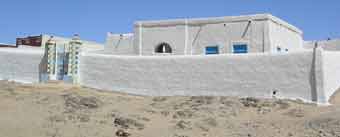
A Abri j'étais invité à passer la nuit chez des gens, je
partageais leurs repas et leurs chambres, toujours cette gentillesse Soudanaise.
Le fils me disait que son père était mort dernièrement,
à cinquante ans. Il était mort aprés une opération
toute simple mais qui avait mal tournée à cause de la négligence
du docteur, maintenant en prison.
Avec
juste 180km à parcourir, je repartais le lendemain de plus belle, mème
condition de piste mais maintenant on ne voit plus persons, plus d'habitations
non plus. Je roule à travers des paysages montagneux, désertique
et sans vie. J'arrive finalement à Wadi Halfa, fin de la route et du
monde me semble t'il car pour continuer il faut prendre le ferryboat et celui-ci
ne vient que le mercredi.
Il n'est pas possible de passer la frontière par route entre le Soudan
et l'Egypte. Il faut prendre le ferry à Wadi Halfa jusqu'à Aswan
en Egypte.
Wadi Halfa est un village trés étendu dans un endroit trés
désertique ou le vent souffle souvent entrainant le sable avec lui. J'ai
trouvé un hotel fait en tôle avec un toît en bois car il
ne pleut jamais içi. Le parterre est en sable avec quelques lits que
l'on partage avec d'autres voyageurs Soudanais ou Egyptiens venus en train car
Wadi Halfa se révéille seulement le Mardi et le mercredi quand
le train vient rencontrer le ferryboat.
Mercredi 26 février.
Cela m'a pris presque toute la journée pour organiser les papiers nécéssaire
et bien que le bâteau était prévu de partir à 14
heures il n'est parti qu'à 18 heures. Donc, avec la moto à bord,
un peu de nourriture et plein d'eau, nous sommes partis pour traverser le
Lac Naser, vers l'Egypte, quelques 200km plus loin.
C'est en regardant le Soudan s'éloignait lentement dans le couché
de soleil que j'ai compris que je disais adieu à la vrai Afrique.
J'ai visité beaucoup de pays dans ma vie mais je n'hésite pas
à dire que les Soudanais sont les plus gentils, hospitaliers et Généreux.
Et oui, ceux sont des Islamiques.
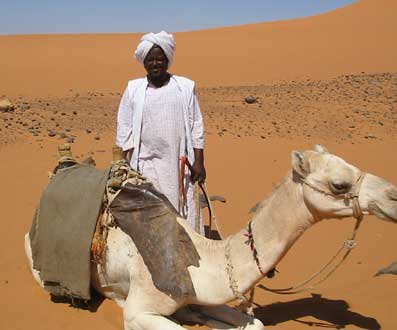
A local with his camel.
Le chameau du desert.
The ancient pyramids of Meroe.
Les anciennes pyramides de Meroe.
Could that be Osama on the
left?
Je crois reconnaitre Osama sur la gauche!
Osama Bin Laden with friends.
Osama et ses amis.
When the going gets tough...
Dans le sable.
A friendly face.
Une figure amicale.
Find the odd one out.
Trouvez l'intrus.
The road in northern Sudan.
La route dans le nord du Soudan.
The town of Wadi Halfa.
La ville de Wadi Halfa.
Taking a break with my friends.
Une pause en compagnie d'amis.


